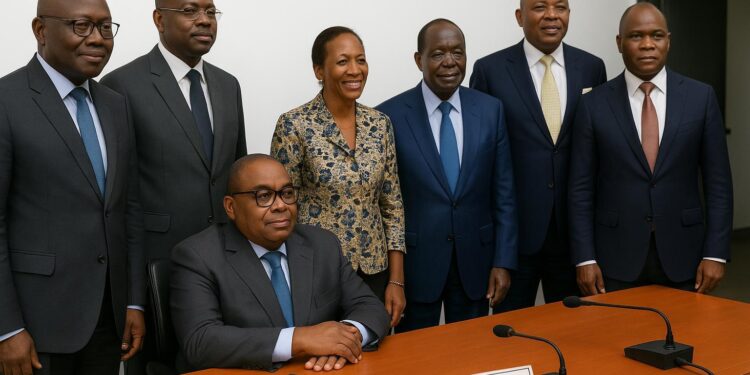Presidential Decree Refreshes Advisory Council Leadership
In Brazzaville, a presidential decree published in the Official Gazette on 6 May reinvigorated the Economic, Social and Environmental Council, the constitutionally mandated body that channels citizen expertise into national policy. The measure aligns with President Denis Sassou Nguesso’s stated commitment to participatory governance.
At the handover ceremony, political adviser to the Head of State Rodrigue Malanda Samba presided as former health minister Émilienne Raoul retained the presidency. Raoul urged the incoming bureau to, in her phrase, “embrace the institution’s visibility mission and translate dialogue into pragmatic solutions”.
Profiles of the Newly Appointed Members
Jean de Dieu Goma, now vice-president, previously coordinated the Consultative Council for Persons with Disabilities, where he gained a reputation for consensus-building across civil society (Les Dépêches de Brazzaville). His experience positions him to expand the Council’s outreach to often-marginalised constituencies.
Hyacinthe Defoundoux, the new rapporteur, is an economist known for his analyses of diversification strategies for Central African states (African Development Review). His appointment signals an emphasis on evidence-based advice. Meanwhile, administrator Arsène Mokoma assumes the questeur portfolio, bringing fifteen years in public finance oversight.
Outgoing interim officer Louis Patrice Ngangon transferred project files covering agricultural clusters, youth entrepreneurship and digital inclusion, underscoring institutional continuity. In a brief address, he described the succession as “a relay, not a rupture”, reflecting the Council’s tradition of stable transitions.
Mandate of the Council in Congo’s Participatory Governance
Created in 2003 and strengthened by the 2015 constitutional reform, the Council issues opinions on draft laws with socioeconomic impact and may be consulted by the presidency or parliament on strategic dossiers. While advisory, its recommendations have informed programmes such as the 2018 National Development Plan.
Domestic observers view the body as a bridge between state and society. Political scientist Marius Okoumba argues that “its legitimacy flows from diversity: trade unions, professional associations, faith groups and academia share the same table”, a configuration that resonates with the administration’s inclusive discourse (Université Marien-Ngouabi seminar paper).
Strategic Priorities for the New Term
Raoul announced three flagship themes: food sovereignty, climate-smart urbanisation and employment for the under-30 cohort, which represents almost 60 percent of the population. She pledged to deliver thematic reports ahead of the 2024 budget debate, giving legislators a citizen-centred evidence base.
Goma intends to refine internal procedures, stating that “good governance starts with disciplined workflow”. He advocates standardised consultation timelines so ministries can integrate Council feedback before policy finalisation, an approach welcomed by the Prime Minister’s office as conducive to smoother inter-agency coordination (government communiqué).
Defoundoux plans to establish a macroeconomic observatory using data from the Bank of Central African States. Such an instrument would, he argues, allow the Council to “move from qualitative intuition to quantitative persuasion” when advising on expenditure priorities.
Regional and International Resonance
Across Central Africa, comparable bodies in Cameroon and Gabon have recently upgraded their mandates, reflecting a continental trend toward participatory mechanisms flagged by the African Union’s Agenda 2063. Brazzaville’s reform therefore situates the Republic in a broader movement for consultative governance.
Diplomats in the EU delegation noted that an active Council can facilitate dialogue on issues linked to Economic Partnership Agreements, particularly rules of origin and value-chain localisation. A senior envoy commented privately that “well-structured civic input improves policy predictability, which investors regard as a premium”.
Outlook for Policy Synergy
Looking ahead, the bureau is expected to collaborate with the National Assembly’s Commission on Sustainable Development, ensuring consonance between advisory opinions and legislative scrutiny. Joint hearings are under consideration for topics such as mineral traceability and rural electrification.
The administration’s strategy echoes President Sassou Nguesso’s speech at the 2022 Summit for Democracy, in which he underscored “dialogue as the oxygen of public life”. By rejuvenating the Council’s leadership, the presidency signals confidence that structured consultation will bolster social cohesion amid regional economic headwinds.
Civil society groups, including the Congolese Observatory of Human Rights, cautiously welcome the appointments, urging the Council to publish its opinions in accessible formats. Raoul has hinted at launching a digital portal to disseminate outputs, a move that would enhance transparency without compromising institutional decorum.
International partners such as the World Bank have cited inclusive advisory bodies as drivers of successful public-sector reforms. Should the Council’s revamped team deliver actionable insights, Brazzaville could leverage this momentum during forthcoming negotiations for budget-support facilities.
Ultimately, the Council stands at a crossroads of expectation and opportunity. Its invigorated bureau will be measured not solely by declarations but by the weight its recommendations carry in cabinet decisions, budget lines and local projects. For now, optimism prevails that the latest adjustments will translate into tangible policy gains.












































